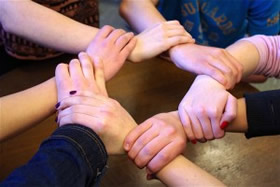
The Flexible Studies Program has always endeavoured to be a space where students are at the centre of their learning. The acronym VOICES reflects the manner in which the Flexible Studies Program will put its foundational philosophies into practice.
Voice & Choice
At the heart of learning is the ability to pursue topics and ideas that intrigue and challenge us. In the Flexible Studies Program, we strive to nurture the natural curiosity that exists within all of us. We look to do this by giving students voice and choice in how they demonstrate their understanding of concepts and through using a structured inquiry-based approach to learning where and when applicable.
Outdoors & Nature
The future of our planet and the future of our children are directly tied together. In order for us to lead healthy and happy lives, we need to be conscious of our connection and impact to the natural world. In order to help facilitate this connection, it is our plan for the English option to have two outdoor education trips each year. In addition to these trips, we have partnered with Swan Lake Nature Sanctuary where we go every Monday afternoon to engage in restoration work, ethnobotany, Environmental Science, and writing.
Inquiry & Innovation
We are looking to create a space where students can begin to develop the ability to be critical and creative thinkers. The following definition of Inquiry Based Learning comes from Alberta Education, and articulates our beliefs well:
Effective inquiry is more than just asking questions. Inquiry-based learning is a complex process where students formulate questions, investigate to find answers, build new understandings, meanings and knowledge, and then communicate their learnings to others. In classrooms where teachers emphasize inquiry-based learning, students are actively involved in solving authentic (real-life) problems within the context of the curriculum and/or community. These powerful learning experiences engage students deeply. (from Education Alberta)
Community & Culture
To aid our students as they pursue their inquiries, the Flexible Studies Program has established partnerships with the Royal BC Museum, the University of Victoria and Camosun College, with local First Nations, with local businesses, NGOs, artists, as well as with our Reynolds parents and alumni. Each of these groups of people have expressed an interest in mentoring young people who share in their passions and are excited to work in concert with the Flexible Studies teachers, creating a diverse team to support our students’ learning. Learn more about these community connections here.
Environment & Relationships
The Flexible Studies Program is often referred to as a family. The environment is one that is welcoming to everyone. The relationships that are formed in the Flexible Studies Program are authentic and help to create a space where students, teachers, and mentors alike are empowered to take risks in pushing themselves to become their best. This environment is created through open dialogue, assessment practices that support students, and the cohort model whereby students and teachers get to know each other over the course of a number of years.
Service to others
The Flexible Studies Program values service to others and thus students are given the opportunity to develop positive character attributes and a sense of social responsibility through participating in organized service projects and volunteer work within the school and surrounding community every year. Here are 10 reasons why we value community service (adapted from UC SanDiego).
#10: It’s good for you.
Volunteering provides physical and mental rewards. It:
· Reduces stress: Experts report that when you focus on someone other than yourself, it interrupts usual tension-producing patterns.
· Makes you healthier: Moods and emotions, like optimism, joy, and control over one’s fate, strengthen the immune system.
#9: It saves resources.
· Volunteering provides valuable community services so more money can be spent on local improvements.
#8: Volunteers gain professional experience.
· You can test out a career.
· You can develop your work ethic.
· You can make connections to community members for future employment or references.
#7: It brings people together.
As a volunteer you can assist in:
· Uniting people from diverse backgrounds to work toward a common goal.
· Building camaraderie and teamwork.
#6: It promotes personal growth and self esteem.
· Understanding community needs helps foster empathy and self-efficacy.
#5: Volunteering strengthens your community.
As a volunteer you can help:
· Support community members (babysitting, helping elders, community projects).
· Improve school tone & culture as well as other needed services (tutoring, tours, grounds clean up).
· Support younger children in the school district (coaching, reading buddies, crafts).
· Improve Environmental Sustainability (beach and park cleanups, tree planting, gardens).
#4: You learn a lot.
Volunteers learn things like these:
· Self: Volunteers discover hidden talents that may change your view on your self-worth.
· Government: Through working with local non-profit agencies, volunteers learn about the functions and operation of our government.
· Community: Volunteers gain knowledge of local resources available to solve community needs.
#3: You get a chance to give back.
· People like to support community resources or programs (like sports teams you might be on or organizations like the BC Cancer Agency) that they use themselves or that benefit people they care about.
#2: Volunteering encourages civic responsibility.
· Community service and volunteerism are an investment in our community and the people who live in it.
#1: You make a difference.
· Every person counts!

